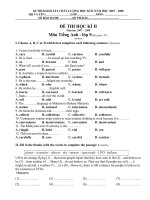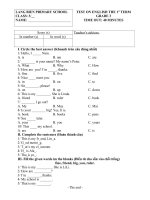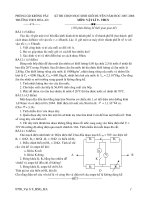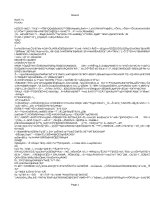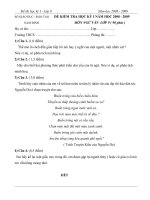Đê thi AV 9 - Pleiku
Bạn đang xem bản rút gọn của tài liệu. Xem và tải ngay bản đầy đủ của tài liệu tại đây (209.49 KB, 7 trang )
1
PHÒNG GIÁO DỤC & ĐÀO TẠO KỲ THI CHỌN HỌC SINH GIỎI THÀNH PHỒ
THÀNH PHỐ PLEIKU NĂM HỌC 2009-2010
*** MÔN THI: TIẾNG ANH- LỚP 9 – (VÒNG 1)
ĐỀ CHÍNH THỨC Thời gian : 150 phút ( Kể cả thời gian phát đề)
( Thí sinh làm bài trực tiếp trên đề thi )
Điểm
Điểm bằng chữ Chữ ký giám khảo1 Chữ ký giám khảo2 Số phách
I/ LISTENING ( 2.5points)
Part 1: a . Listen to people talking about how they spend their free time . Check (
) the
correct information about each person.( You will hear twice for both a & b )
Exercises a lot Exercises a little Never exercises
1. Bill
2 Liz
3. Victor
4. Maria
5. David
b. Listen again. Match the people on the left with the activities on the right.
1. Bill ____ a. plays golfs
2. Liz ____ b. rides bicycle
3. Victor ____ c. plays baseball
4. Maria ____ d. takes walks
5. David ____ e. plays video games
Part 2: Look at the notes about Tanya Perry. You will hear a man talking about her life. Fill
in the missing information in the numbered space ( You will hear three times )
TANYA PERRY
Born in London in 1948
In 1952 , family moved to (1)
At school with Jack Peters , the famous (2)
Wrote some (3) while still at school .
During the early 1970s worked as a (4)
The film called (5) won the first prize at a French Film Festival.
Now has (6) plays in print.
Part 3: Make an accent mark OVER the stressed syllable of the words:(1 point)
EX : compúlsory
1. necessity 2. documentary 3. purpose 4. mausoleum
5. unique 6. communicate 7. considerate 8. magnificent
9. transmit 10. volunteer
II/VOCABULARY & GRAMMAR:( 2.0 points)
Part 1. Put the verbs in brackets into the correct tenses or forms.
1. The robbers (catch) as they (leave) the bank last week .
2. Mr Nam was very angry with the newspaper agent because his Sunday newspaper
(not deliver ).
2
3. Don’t worry. When you (arrive) in New York, you
(pick up) by one of our drivers and _(take) to the conference center
4. Anyone who (not finish)his work won’t be allowed to leave now.
5. He would rather that it ( not be) winter now.
6. If only I ( meet) her yesterday.
7. Nothing (do) since I moved here.
Part 2 : Fill in the gap with the correct form of the word in capital letters.
Apart from television, the cinema is the most popular form of (0) entertainment
(ENTERTAIN) for most people because it is still relatively (1) (EXPENSE)
Hollywood is, of course, the capital of the (2) (NATION) cinema industry.
Hollywood movies make up (3) (ROUGH) 75% of all the films we watch at
our local cinemas. Although we may find it difficult to remember the names of (4)
(ITALY) and French film stars, Hollywood stars, such as Sylvester Stallone and Meryl Streep are
(5) (HOUSE) names all around the world. Moreover, only Hollywood
seems to make certain kind of films (6) (SUCCESS).
(7) (MUSIC) are one example but we can also include westerns
although for a time “spaghetti westerns” were quite (8) (FASHION) with
cinema goers. But cowboys and Indians are really a Hollywood (9)
(SPECIAL) and they are still going strong after all these years. Such films, however, have not
remained (10) (TOUCH) by time and changes in attitudes, the cowboys
are no longer always the goodies as they were in the 1940s.
III/ READING( 2.5points)
Part 1: Read the following story carefully and then answer the questions that follow.
The Shawl
This story happened in Philadelphia towards the end of the nineteenth century. One winter
evening Dr. S. Weir Mitchell sat down in an armchair and started reading a book, but after an
exhausting day at the surgery, he soon felt asleep. A short while later he woke up suddenly when
heard a doorbell ringing. There was a girl standing on the doorstep. It was cold and snow was
falling, but she was wearing only a thin shawl around her shoulders and she was shivering. “My
mother is very ill,” she said. “please come.”
Walking through the dark and snowy streets was not easy, but eventually they came to an
old apartment building and the girl led the doctor up to a room on the third floor. There was a
woman lying on the bed and the doctor recognized her as a former servant of his. After examining
her, he took out his notepad and looked around for the girl. “Where’s your daughter?” He asked
the woman. “I need her to go for some medicine.”
“My daughter?” She said in surprise. “My daughter died a month ago.” “But that’s
impossible,” said the doctor. “She came to fetch me. I saw her. She was wearing a shawl.”
“My daughter’s shoes and her shawl are in there,” said the woman, pointing to a small
cupboard. The doctor stopped writing out the prescription and went to a cupboard. He saw the
girl’s shawl lying on the shelf. It was folded and dry. It clearly had not been worn that night.
Questions:
1. Give a(n) synonym / equivalent / explanation of the following words or phrases from the text.
a. a shawl :
b. exhausting :
c. was shivering :
d. eventually :
e. prescription :
3
2. When and where did the incident take place?
3. What was the weather like that night? How did the girl feel? Why so?
4. What was the relationship between the doctor and the woman?
5. why did the woman show the doctor that her daughter’s shoes and shawl were in a
cupboard?
6. Who was the girl who came to the doctor’s house?
Part 2 :Fill in each numbered blank with one suitable word.
There has been a revolution in the world of newspapers. Not many years (1) ,
newspapers were still being produced using techniques unchanged for (2)
hundred years.
The journalists gave their stories to a typist, who prepared them for an editor who passed
them on (3) the printer. The printer, who was a (4) skilled man, set
up the type. (5) was then collected to make the pages. When the pages were
complete, the printing machines could be (6)
Nowadays what (7) ? The journalists type their stories into a computer. The
(8) checks their spelling, plans the page, shapes the articles. When the pages are
ready, another computer may control the printing.
(9) can be no doubt about it, producing a newspaper is an entirely different
(10) now.
IV/ WRITING( 3.0 points)
Part 1: Rewrite each of the following sentences in such a way that it means exactly the same
as the sentence printed before.
1. They knew little about the job of their choice.
They had
2. I got on a train. I wanted to go to a station. The train didn’t stop there.
The train I
3. “When you have cleaned the sitting room, will you please light the fire there? It’s rather
chilly today”, My mother said to me.
My mother
4. Without a passport she couldn’t have left the country.
If she
5. That restaurant is so dirty that no one wants to eat there.
It ‘s such
6. I thought this meal would cost more than it did
This meal didn’t
7. Can you give me a lift? I’ll be late otherwise
Unless
4
8. I haven’t been to the cinema for two months
The last time
9. Immediately after his arrival, things went wrong.
No sooner
10. She urged her husband to write the letter.
She urged that
Part 2: Guided sentence building. Use the following sets of words and phrases to write complete
sentences:
1. boy/ whose work/ I/ show / you/ yesterday/ cleverest/ school.
2. After/ walk / three hours / we/ stop/let/ others/ catch / up/ us.
3. It / about/ time/ you/ have/ hair/ cut.
4. When/ you/ see/ me/ airport/ this morning/ see off/ friend.
5. She/come/ home early/ so as/ plenty/ time / cook /dinner/ yesterday.
Part 3: Letter-writing
The British Trust is offering 10 scholarships of $6000 to foreign students who wish to do a
Master’s degree at a British university in one of the following subjects: English Literature,
History, Science and Economics.
Write a letter of inquiry to the institution requesting for more information about the courses,
using these cues:
+ advertisement: the Educational Gazette
+ interest: a Master’s degree in English Literature
+ level: the Cambridge First Certificate with grade A
+ more information about English if necessary.
( You mustn’t write or sign your name in this letter)
Dear Sir,
Sincerely yours,
Tom Robinson.
5
PHÒNG GIÁO DỤC & ĐÀO TẠO KỲ THI CHỌN HỌC SINH GIỎI THÀNH PHỒ
THÀNH PHỐ PLEIKU NĂM HỌC 2009-2010
*** MÔN THI: TIẾNG ANH- LỚP 9 (VÒNG 1)
ĐỀ CHÍNH THỨC
ĐÁP ÁN & BIỂU ĐIỂM
I/ LISTENING
Part 1: 0.9 points( each 0.1)
a . b.
1. Exercises a lot 1. c
2. Exercises a little 2. d
3. Never exercises 3. e
4. Exercises a lot 4. a
5. Exercises a little 5. b
Part 2: 0.6 points( each 0.1)
1. (the) north-west
2. poet
3. (short) stories
4. waitress
5. City Life
6. 24 ( twenty-four)
Part 3: 1 point ( each 0.1)
1. necéssity 2. documéntary 3. púrpose 4. mausoléum
5. uníque 6. commúnicate 7. consíderate 8. magníficent
9. transmít 10. volunteér
II/VOCABULARY & GRAMMAR:
Part 1. 1 point ( each 0.1)
1.were caught - were leaving
2. hadn’t been delivered
3. arrive - will be picked up - taken
4. hasn’t finished
5. weren’t
6. had met
7. has been done
Part 2. 1 point ( each 0.1)
1. inexpensive 2. international 3. roughly 4. Italian 5. household
6. successfully 7. Musicals 8. fashionable 9.speciality 10. untouched
III/ READING
Part 1. 0.5 points ( each 0.1 )
1. a) = a scarf (a large piece of cloth, made of wool, usually worn by a woman round
the shoulders or head.)
b) = very tired
c) = was trembling / shaking from cold or fear. (because of )
d) = at last, in the end, finally.
e) = a form on which a doctor has written the name of the medicine / drugs that one
needs.
*1 points ( each 0.2 )
6
2. The incident took place one winter evening in Philadelphia towards the end of
nineteenth century.
3. It was cold and snowy. She was shivering as / since / because she was wearing only a
thin shawl
4. She was a former servant of Dr. S. Weir Mitchell.
5. To explain that her daughter died a month ago.
6. She was a ghost / the ghost of the woman’s daughter who died a month ago
Part 2. 1 point ( each 0.1 )
1. ago 2. a/one 3.to 4. very 5. This
6. started/worked 7. happens 8. computer 9. There 10. business
IV/ WRITING
Part 1: 1 point ( each 0.1 )
11. little knowledge of the job of their choice.
12. got on didn’t stop at the station which I wanted to go
13. . said that it was chilly that day and asked me to light the fire there when I
had cleaned the sitting room
14. hadn’t had a passport she couldn’t have left the country.
15. a dirty restaurant that no one wants to eat there.
16. cost as much as I thought it would
17. you give me a lift , I’ll be late
18. I went to the cinema was two months
19. had he arrived than , things went wrong.
20. her husband write the letter.
Part 2: 0.5 point ( each 0.1 )
1.The boy whose work I showed you yesterday is the cleverest student in my school.
2. After walking for three hours , we stopped to let the others catch up with us.
3. It is about time you had your hair cut.
4. When you saw me at the airport this morning , I was seeing off my friend.
5. She came home early so as to have plenty of time to cook dinner yesterday.
Part 3: 1.5 point
Dear Sir ,
I saw your advertisement in the Educational Gazette yesterday . I am interested in doing a
Master’s degree in English Literature and I would like some information about your university .
I passed the Cambridge First Certificate examination last year with grade A and I would
really need to come to Britain to continue my study . Could you please send details of the
courses? I can supply more information about my English if necessary.
I look forward to hearing from you.
TRANSCRIPT
Part 1: Let’s listen.
1. I think exercise is so important to good health. There is a really good sports club near my
school. During the week, I play tennis there for an hour before school starts. On weekends,
I usually work out at the gym near my house for a few hours. I also play baseball with
some friends from school. It’s so much fun!
2. I don’t like jogging or doing anything too energetic. I prefer taking walks. I like to take a
short walk every day through the park across from my house. Sometimes my boyfriend
goes with me. It’s nice total and look at the flowers and trees. On Sunday, I like to swim,
but for only about a haft hour. I sleep the rest of the weekend.
7
3. I am a big football fan, but I only watch it on TV. I can’t stand playing it! There are great
games to watch on the weekend. I also enjoy watching tennis I’d like to learn someday, but
I don’t like to sweat. I love chess and often play with my younger sister. She’s really good
at it and usually wins. On the weekends, I love to play video games with some of my
friends.
4. I just love to exercise! I like many different sports. Let’s see I like swimming a lot. I get
up very early, around 5a.m, and swim for two hours from Monday to Friday. I also enjoy
basketball and play with a group of friend from work every Tuesday night. And I’ve also
started playing golf this year. Before playing, I go jogging to warm up.
5. I enjoy exercise, but I don’t do it as much as I should. I meet a friend every Wednesday and
we play tennis. I’m not a very good player, but it’s fun and we usually play for an hour. On
weekends, I like to bicycle in our neighborhood. I guess I spend an hour or two doing that.
Oh, and I love baseball, but only watching it while sitting on the couch eating popcorn!
Part 2:
Interviewer: Hello and welcome. We’re spending the first part of today’s programmed talking
about Tanya Perry, and with me today is Ray Potter, her friend and colleague for
many years
Ray: Yes, well, I’ve known Tanya for nearly 20 years. Not many people know that she
was born in London, in 1948. In 1952, her parents moved with Tanya and her
brother to the north west. They lived in various places, before finally coming to
Manchester in 1956.
Tanya spent a very happy period at school. In fact she was in the same class as Jack
Peters, the famous poet. David Thompson, the artist, was also at the school – a
couple of years below her, I think. So it was an interesting time for Tanya, who
actually began to write short stories while she was at school. One of her stories
appeared in the school magazine – I have a copy here. It’s extraordinary, you can
see a lot of her idea starting to grow. When Tanya left school, she didn’t go to
university, as Jack Peters did, but got a job immediately. She was never interested in
university life. What she wanted was to be part of the real world, to meet different
people and get more experience of life. So in the early 1970s she became a waitress,
working in what was then one of the most popular cafés in Manchester. She was
writing at night and in 1975 she had her first play performed, at the Edinburgh
festival.
She gave up her day job the following year, to be able to write full-time.
Several of her plays were performer, including one at the Court Theatre in London.
This was where she met film director Robin Negate, who she later married. Robin
introduced her to the film world and, in 1979, she wrote the story which later
became the film ‘City life’, which Robin directed. It won the prize for best foreign
film at an important French Film Festival in 1984.
Tanya could have moved to Hollywood then, but she was still married to the
theater – and to Robin – so she decided to stay here. Now she has 24 plays in print,
18 in translation, which makes her work very widely known all over the world.
